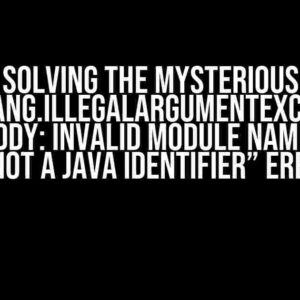Introduction
Lombok is a popular Java library that simplifies the process of writing boilerplate code by providing annotations that can be used to generate constructors, getters, setters, and other methods at compile-time. However, have you ever wondered how to check if a field is annotated by a Lombok annotation at runtime? In this article, we will explore the different ways to achieve this and provide a comprehensive guide on how to do it.
Why Check for Lombok Annotations at Runtime?
Before we dive into the solution, let’s take a step back and understand why we need to check for Lombok annotations at runtime. There are several scenarios where this might be necessary:
* **Reflection-based frameworks**: If you’re using a reflective framework like Spring or Hibernate, you might need to check if a field is annotated with a specific Lombok annotation to determine how to handle it.
* **Dynamic configuration**: In some cases, you might need to dynamically configure your application based on the presence or absence of Lombok annotations.
* **Code analysis and validation**: You might want to analyze your code and validate if certain Lombok annotations are present or not.
Method 1: Using Java Reflection
One way to check if a field is annotated by a Lombok annotation at runtime is to use Java reflection. Here’s an example of how you can do this:
import java.lang.reflect.Field;
import lombok.Getter;
public class MyClass {
@Getter
private String myField;
public static void main(String[] args) throws Exception {
Field field = MyClass.class.getDeclaredField("myField");
if (field.isAnnotationPresent(Getter.class)) {
System.out.println("The field is annotated with @Getter");
} else {
System.out.println("The field is not annotated with @Getter");
}
}
}
In this example, we use the `getDeclaredField()` method to get the `Field` object for the `myField` field. Then, we use the `isAnnotationPresent()` method to check if the field is annotated with the `@Getter` annotation.
Method 2: Using the Lombok Annotations API
Lombok provides an API for working with annotations, which can be used to check if a field is annotated with a specific annotation. Here’s an example of how you can do this:
import lombok.core.AnnotationValues;
import lombok.Getter;
public class MyClass {
@Getter
private String myField;
public static void main(String[] args) {
AnnotationValues annotationValues = new AnnotationValues(MyClass.class);
if (annotationValues.findAnnotation(Getter.class) != null) {
System.out.println("The field is annotated with @Getter");
} else {
System.out.println("The field is not annotated with @Getter");
}
}
}
In this example, we create an instance of the `AnnotationValues` class, passing in the `MyClass.class` object. Then, we use the `findAnnotation()` method to check if the field is annotated with the `@Getter` annotation.
Method 3: Using a Library like Java Annotation Index
Another way to check for Lombok annotations at runtime is to use a library like Java Annotation Index (JAI). JAI provides a way to index and query annotations in Java code. Here’s an example of how you can use JAI to check for Lombok annotations:
import java.util.Set;
import org.javaannotations.index.Index;
import org.javaannotations.index.IndexBuilder;
import org.javaannotations.index.AnnotationProvider;
import lombok.Getter;
public class MyClass {
@Getter
private String myField;
public static void main(String[] args) {
Index index = IndexBuilder.createIndex();
AnnotationProvider annotationProvider = index.getAnnotationProvider();
Set<Annotation> annotations = annotationProvider.getAnnotations(MyClass.class.getDeclaredField("myField"));
if (annotations.stream().anyMatch(a -> a.annotationType() == Getter.class)) {
System.out.println("The field is annotated with @Getter");
} else {
System.out.println("The field is not annotated with @Getter");
}
}
}
In this example, we create an instance of the `Index` class using the `IndexBuilder` class. Then, we use the `getAnnotationProvider()` method to get an instance of the `AnnotationProvider` class. Finally, we use the `getAnnotations()` method to get a set of annotations for the `myField` field, and then use Java 8 streams to check if the `@Getter` annotation is present.
Comparison of Methods
Each of the methods described above has its own advantages and disadvantages. Here’s a comparison of the methods:
| Method | Advantages | Disadvantages |
|---|---|---|
| Java Reflection |
|
|
| Lombok Annotations API |
|
|
| Java Annotation Index |
|
|
Conclusion
In this article, we explored three different ways to check if a field is annotated by a Lombok annotation at runtime. Each method has its own advantages and disadvantages, and the choice of method depends on the specific use case and requirements. By using one of these methods, you can write more robust and efficient code that takes into account the presence or absence of Lombok annotations.
FAQs
-
What is Lombok?
Lombok is a Java library that simplifies the process of writing boilerplate code by providing annotations that can be used to generate constructors, getters, setters, and other methods at compile-time.
-
Why do I need to check for Lombok annotations at runtime?
There are several scenarios where checking for Lombok annotations at runtime is necessary, such as in reflective frameworks, dynamic configuration, and code analysis and validation.
-
What is Java Annotation Index?
Java Annotation Index (JAI) is a library that provides a way to index and query annotations in Java code.
Frequently Asked Question
Get ready to uncover the secrets of Lombok annotations at runtime!
How can I check if a field is annotated by a Lombok annotation at runtime using reflection?
You can use the Java Reflection API to access the annotations of a field at runtime. Specifically, you can use the `getDeclaredField()` method to get the field, and then call `getAnnotations()` to retrieve an array of annotations. Then, you can iterate through the annotations and check if the desired Lombok annotation is present.
What is the best way to check for Lombok’s `@Getter` and `@Setter` annotations on a field?
When checking for `@Getter` and `@Setter` annotations, you need to look for the corresponding `Getter` and `Setter` annotations from the Lombok package. For example, you can use `field.getAnnotation(Getter.class)` or `field.getAnnotation(Setter.class)` to check if the field has the respective annotation.
Can I use Java 8’s `Optional` to handle the case when a field is not annotated with a Lombok annotation?
Yes, you can use Java 8’s `Optional` to handle the case when a field is not annotated with a Lombok annotation. For example, you can use `Optional.ofNullable(field.getAnnotation(SomeLombokAnnotation.class))` to wrap the annotation in an `Optional`. Then, you can use the various `Optional` methods, such as `ifPresent()` or `orElse()`, to handle the absence of the annotation.
How can I check if a field is annotated with a custom Lombok annotation at runtime?
To check if a field is annotated with a custom Lombok annotation, you need to use the fully qualified name of the annotation class. For example, if your custom annotation is `@MyCustomAnnotation`, you can use `field.getAnnotation(MyCustomAnnotation.class)` to check if the field has the annotation.
Are there any performance considerations when checking for Lombok annotations at runtime?
Yes, there are performance considerations when checking for Lombok annotations at runtime. Reflection can be slower than regular method calls, so you should be mindful of the frequency and location of these checks in your code. Additionally, you can use caching or other optimization techniques to minimize the performance impact.

![How to Check if a Field is Annotated by a Lombok Annotation at Runtime? [duplicate] How to Check if a Field is Annotated by a Lombok Annotation at Runtime? [duplicate]](https://triphena.hkhazo.biz.id/wp-content/uploads/sites/49/2024/07/how-to-check-if-a-field-is-annotated-by-a-lombok-annotation-at-runtime-duplicate-with-text.jpg)



